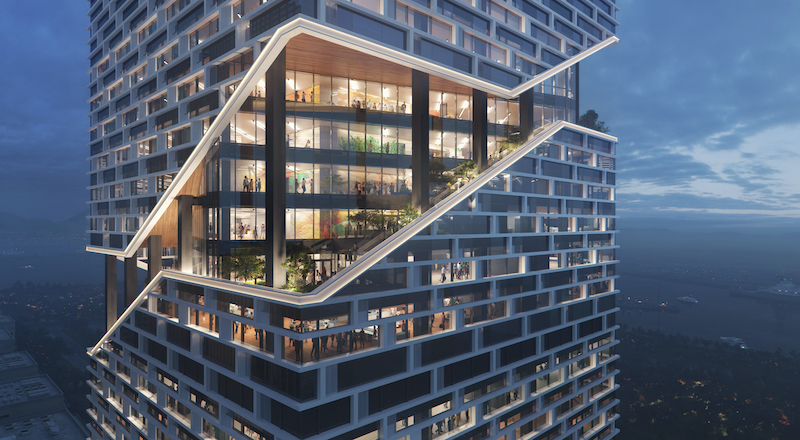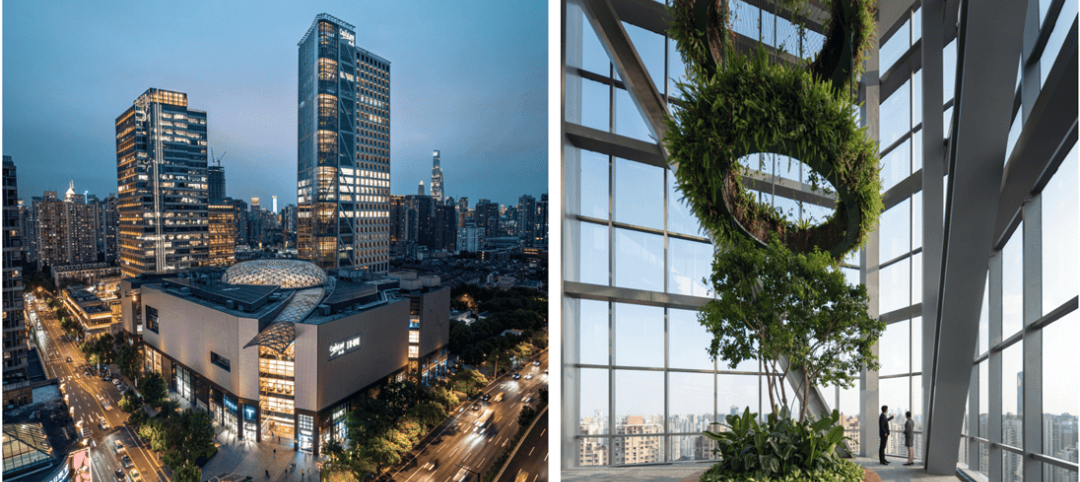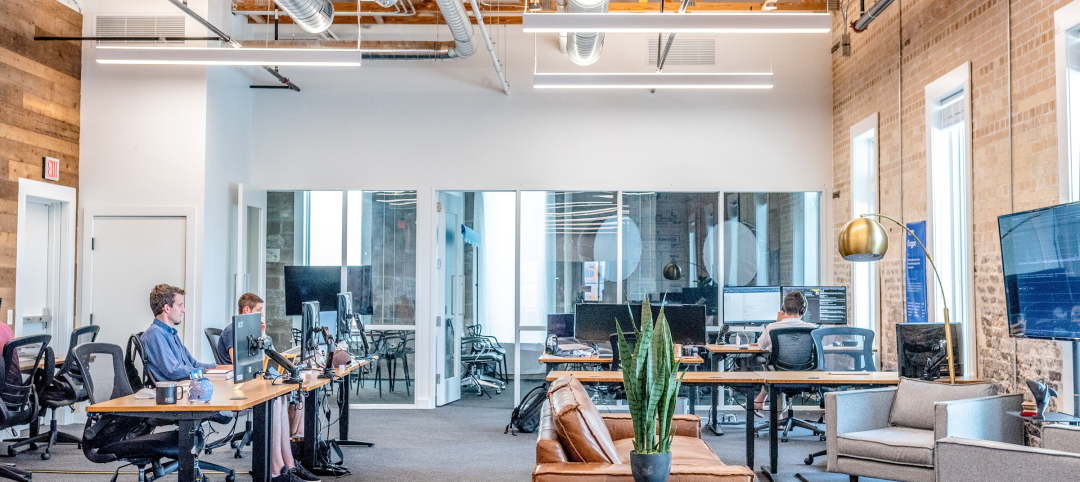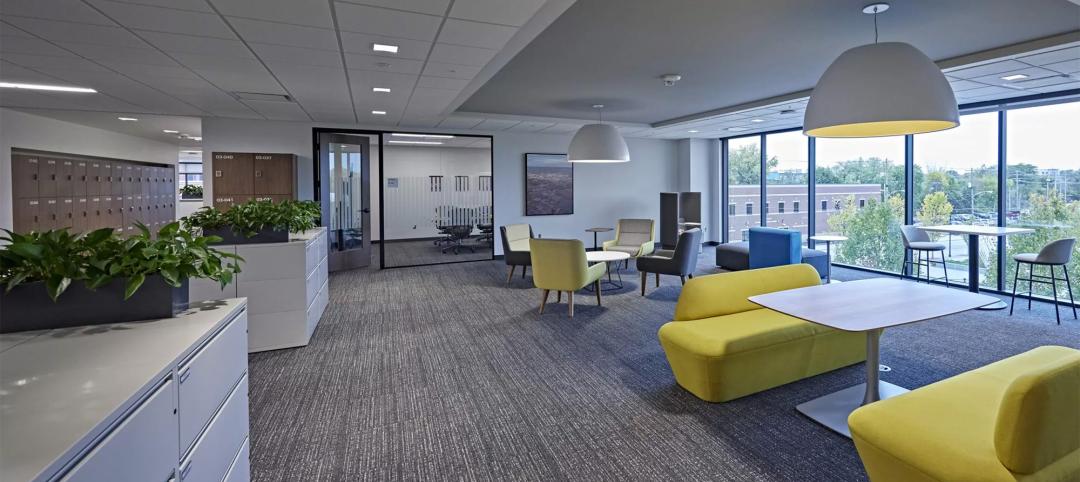Construction began last month on the new corporate headquarters for vivo, a fast-growing China-based tech and smartphone provider. The building is scheduled to be substantially completed in the fall of 2025, when it will include as part of its amenities package indoor-outdoor gardens on every one of its levels.
The 32-story, 97,000-sm tower, which will soar 150 meters in the Bao’an district of Shenzhen, China, will feature gardens that ascend, in a spiral design, alongside a health- and wellness-focused work environment.
“We know that today’s workers thrive in ‘whole life’ environments that integrate nature, health and work. Our design is the physical embodiment of that ethos—fluid, sustainable, and center[ed] around the wellbeing of those who use the space,” says Robert Mankin, Partner in charge of workplace design at NBBJ, the design architect on this project.
GARDENS WILL EVOKE CHINA’S BIO-DIVERSITY
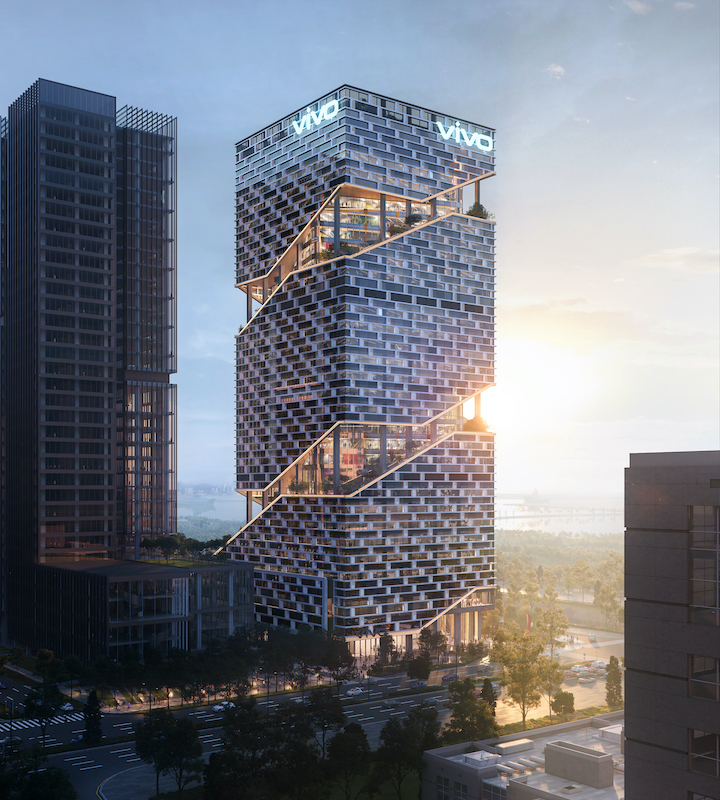
The building, scheduled for completion in 2025, will rise 150 meters.
Along with NBBJ, the Building Team includes Atkins (sustainability consultant), InHabit (façade consultant) BPI (lighting consultant), CADG (landscape), and WSP (vertical transportation). The local AE team is overseen by Tongji Architectural Design, whose scope includes construction drawings, as well as structural and MEP engineering.
The building’s green spaces move from a ground-level plaza with retail through the tower, where they transition to evoke the diverse biomes found in Southeast China, from coastal wetlands and lowland forests to subtropical and alpine forests.
Also see: A Poland firm takes vegetative façade to a new level
The building is designed to achieve WELL and LEED Gold certifications. To protect against rising flood waters due to climate change and typhoons, NBBJ has proposed sustainability features that include permeable surfaces and landscaping for drainage back into the ground.
Rainwater will be captured in underground tanks and reused.
WORKPLACE ZONES GET FULL EFFECT OF GARDENS
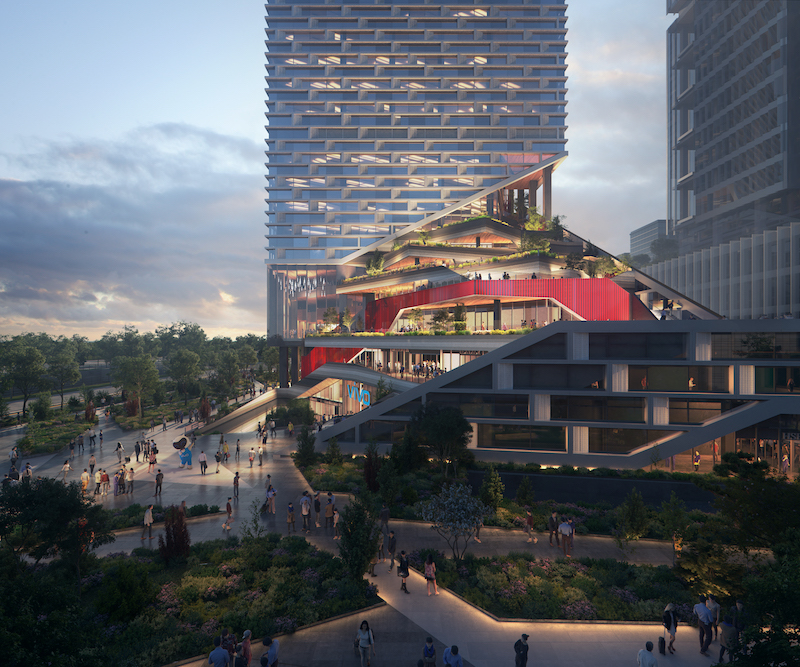
The gardens on the first four above-ground floors will be connected, and lead to a collection of gardens and terraces on the middle floors.
Since the outdoor gardens spiral up and change location on each level, “we developed a smart and systematic planning strategy to zone the workspaces so they get the most of the gardens,” explains Vivian Ngo, a Principal and one of NBBJ’s architects on this project, in written responses to BD+C’s questions.
So pantries will always be adjacent to the gardens as a starting point, with workspaces shifting around on each level. Ngo notes that, in a typical office plan, the core is usually the starting point.
To minimize columns, some of the outdoor garden spans are quite large, says Ngo. The structural engineering ensures that the garden zone has enough capacity for planting soil and enough clearance in the floor below without additional columns.
Furthermore, in typhoon-prone Shenzhen, the outdoor elements in these high-rise gardens, such as plant species and exterior doors, will need to withstand storms.
CLIENT LOOKS BEYOND CONSTRUCTION COST
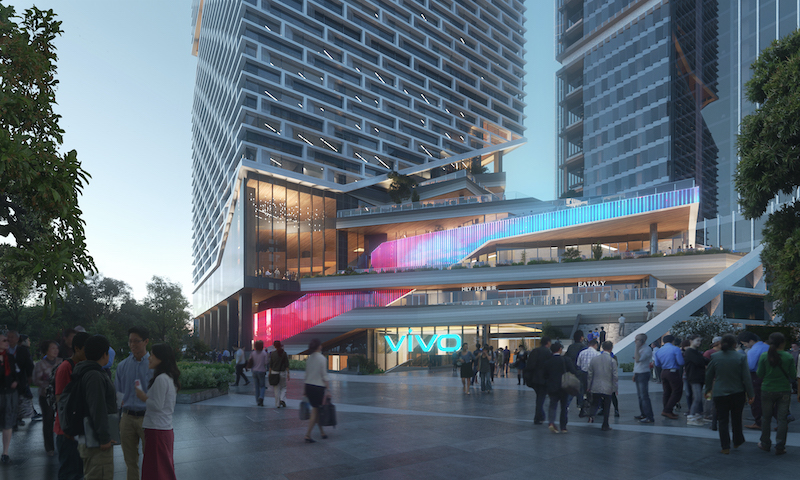
A welcoming street-level plaza will include retail.
Ngo says that the design team considered whether to connect the gardens throughout the entire building, so that occupants could walk from level 5 (the first floor above parking) to level 32 uninterrupted. The team ultimately decided, for efficiency sake, to connect the first four floors with gardens on the same side, as one unit.
The building will coil upward to The Atrium—a collection of terraces and gardens at the building’s middle levels—before finishing at the penthouse area that offers event space, conference rooms, and a view of Qianhai Bay.
Ngo says that while the building was designed before the coronavirus was declared a pandemic last March, its connecting stairs “could help decrease elevator use when traveling short distances between levels.”
The area of covered outdoor space counts toward the building’s gross floor area, or GFA, according to local codes. That’s an added cost, explains Ngo, and somewhat contrary to traditional real estate development economics. “However, the client was very open-minded,” she says, in its support of the outdoor garden design and its promise of unique wellness and productivity benefits “to create value beyond what can be measured in dollars or yuans.”
Related Stories
High-rise Construction | Jul 29, 2024
Safdie Architects’ Shanghai office tower features glass-enclosed corner garden that ascends the 35-story structure
Safdie Architects has announced the completion of LuOne Mixed-Use Complex—a business, retail, and entertainment development in the Luwan district of Shanghai, China. The mixed-use complex consists of an eight-level retail galleria, which opened in 2018, and a 35-story office tower, which recently reached completion.
Smart Buildings | Jul 25, 2024
A Swiss startup devises an intelligent photovoltaic façade that tracks and moves with the sun
Zurich Soft Robotics says Solskin can reduce building energy consumption by up to 80% while producing up to 40% more electricity than comparable façade systems.
Great Solutions | Jul 23, 2024
41 Great Solutions for architects, engineers, and contractors
AI ChatBots, ambient computing, floating MRIs, low-carbon cement, sunshine on demand, next-generation top-down construction. These and 35 other innovations make up our 2024 Great Solutions Report, which highlights fresh ideas and innovations from leading architecture, engineering, and construction firms.
Office Buildings | Jul 22, 2024
U.S. commercial foreclosures increased 48% in June from last year
The commercial building sector continues to be under financial pressure as foreclosures nationwide increased 48% in June compared to June 2023, according to ATTOM, a real estate data analysis firm.
Sponsored | Office Buildings | Jul 17, 2024
Unlocking Sustainability: Smart Access in the Coworking Space
Smart building technologies, including modern access control systems, are transforming coworking spaces by advancing sustainability initiatives and offering new ways to create and operate efficient working spaces. Learn more about the benefits of eco-friendly practices, from reducing carbon emissions to cutting operating costs, and discover how choosing the right partners can amplify your green efforts.
Adaptive Reuse | Jul 12, 2024
Detroit’s Michigan Central Station, centerpiece of innovation hub, opens
The recently opened Michigan Central Station in Detroit is the centerpiece of a 30-acre technology and cultural hub that will include development of urban transportation solutions. The six-year adaptive reuse project of the 640,000 sf historic station, created by the same architect as New York’s Grand Central Station, is the latest sign of a reinvigorating Detroit.
Government Buildings | Jul 8, 2024
GSA adopts new accessibility guidelines for federal properties
The U.S. General Services Administration (GSA) adopted a new rule with new accessibility guidelines for federal buildings. The rule establishes that pedestrian facilities in the public right-of-way are readily accessible to and usable by people with disabilities.
Office Buildings | Jul 8, 2024
Office vacancy peak of 22% to 28% forecasted for 2026
The work from home trend will continue to put pressure on the office real estate market, with peak vacancy of between 22% and 28% in 2026, according to a forecast by Moody’s.
Office Buildings | Jul 1, 2024
Mastering office layouts: 5 primary models for maximum efficiency and productivity
When laying out an office, there are many factors to consider. It’s important to maximize the space, but it’s equally important to make sure the design allows employees to work efficiently.
Smart Buildings | Jul 1, 2024
GSA to invest $80 million on smart building technologies at federal properties
The U.S. General Services Administration (GSA) will invest $80 million from the Inflation Reduction Act (IRA) into smart building technologies within 560 federal buildings. GSA intends to enhance operations through granular controls, expand available reporting with more advanced metering sources, and optimize the operator experience.


